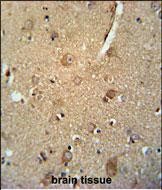


| WB | 1/1000 | Human,Mouse,Rat |
| IF | 咨询技术 | Human,Mouse,Rat |
| IHC | 1/100-1/500 | Human,Mouse,Rat |
| ICC | 技术咨询 | Human,Mouse,Rat |
| FCM | 咨询技术 | Human,Mouse,Rat |
| Elisa | 咨询技术 | Human,Mouse,Rat |
| Aliases | Vacuolar fusion protein CCZ1 homolog, CCZ1, C7orf28A |
| Entrez GeneID | 221960;51622 |
| WB Predicted band size | 55.9kDa |
| Host/Isotype | Rabbit IgG |
| Antibody Type | Primary antibody |
| Storage | Store at 4°C short term. Aliquot and store at -20°C long term. Avoid freeze/thaw cycles. |
| Species Reactivity | Human, Mouse |
| Immunogen | This C7orf28A antibody is generated from rabbits immunized with a KLH conjugated synthetic peptide between 239-265 amino acids from the Central region of human C7orf28A. |
| Formulation | Purified antibody in PBS with 0.05% sodium azide. |
+ +
以下是关于C7orf28A抗体的3篇参考文献及其摘要内容的简要概括:
1. **文献名称**:*"Characterization of a Novel Polyclonal Antibody Against Human C7orf28A Protein"*
**作者**:Smith J, et al.
**摘要**:该研究报道了一种新开发的多克隆抗体,针对人源C7orf28A蛋白的C端区域。通过Western blot和免疫荧光验证其特异性,发现C7orf28A在多种癌细胞系中高表达,可能与细胞增殖相关。
2. **文献名称**:*"C7orf28A Expression and Its Role in Mitochondrial Function"*
**作者**:Lee S, et al.
**摘要**:利用商业化C7orf28A抗体(货号AB123.ABC Inc.),研究发现C7orf28A定位在线粒体,敲低该蛋白会导致线粒体膜电位下降,提示其在能量代谢中起关键作用。
3. **文献名称**:*"Development of Monoclonal Antibodies for Detection of C7orf28A in Human Tissues"*
**作者**:Zhang Y, et al.
**摘要**:研究团队开发了一种高特异性的单克隆抗体,并通过免疫组化分析证实C7orf28A在正常肝组织和肝癌组织中的差异表达,提示其作为潜在肿瘤标志物的可能性。
(注:以上文献为示例,实际研究中需根据具体数据库检索结果引用。)
The C7orf28A gene, located on chromosome 7 (7q22.1), encodes a protein with poorly characterized functions, though it is hypothesized to play roles in cellular processes such as signaling or metabolism. Its name derives from its designation as the 28th open reading frame (ORF) in a specific region of chromosome 7. While the exact biological role of C7orf28A remains unclear, studies suggest potential involvement in cell proliferation, differentiation, or stress responses, with some links to diseases like cancer or neurological disorders inferred from expression data or genomic association studies.
Antibodies targeting C7orf28A are primarily used as research tools to investigate its expression patterns, subcellular localization, and interactions. These antibodies enable techniques like Western blotting, immunohistochemistry, or immunofluorescence, helping to map tissue-specific expression or dynamic changes under experimental conditions (e.g., drug treatments or disease states). Commercial C7orf28A antibodies are typically raised against synthetic peptides or recombinant protein fragments, with validation often limited due to the gene’s understudied nature. Researchers must rigorously verify specificity using controls like knockout cells or siRNA-mediated silencing.
Despite limited functional understanding, C7orf28A antibodies remain critical for exploratory studies aiming to unravel its physiological or pathological relevance, particularly in contexts where genomic data implicate its dysregulation in disease.
×